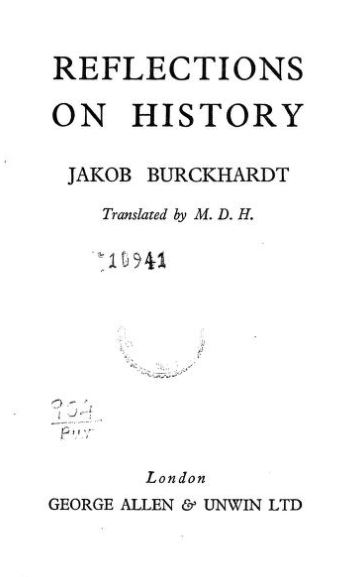‘Reflections On History’ PDF Quick download link is given at the bottom of this article. You can see the PDF demo, size of the PDF, page numbers, and direct download Free PDF of ‘Reflections On History’ using the download button.
Reflections On History PDF Free Download

Reflections On History
What we term virtue is often but a mass of various actions and diverse interests, which fortune, or our own industry, manage to arrange; and it is not always from valor or from chastity that men are brave, and women chaste.
“Who combats bravely is not therefore brave, He dreads a death-bed like the meanest slave; Who reasons wisely is not therefore wise, His pride in reasoning, not in acting, lies.”
2. Self-love is the greatest of flatterers.
3. Whatever discoveries have been made in the region of self-love, there remain many unexplored territories there.
[This is the first hint of the system the author tries to develop. He wishes to find in vice a motive for all our actions, but this does not suffice for him; he is obliged to call other passions to the help of his system and to confound pride, vanity, interest, and egotism with self-love. This confusion destroys the unity of his principle.
4. Self-love is more cunning than the most cunning man in the world.
5. The duration of our passions is no more dependent upon us than the duration of our life. [Then what becomes of free will?
6. Passion often renders the most clever man a fool, and even sometimes renders the most foolish man clever.
7. Great and striking actions which dazzle the eyes are represented by politicians as the effect of great designs, instead of which are commonly caused by temper and passion.
Thus the war between Augustus and Anthony, which is set down to the ambition they entertained of making themselves masters of the world, was probably but an effect of jealousy.
8. The passions are the only advocates which always persuade. They are a natural art, the rules of which are infallible; and the simplest man with passion will be more persuasive than the most eloquent without.
9. The passions possess a certain injustice and self-interest which makes it dangerous to follow them, and in reality, we should distrust them even when they appear most trustworthy.
10 In the human heart there is a perpetual generation of passions; so that the ruin of one is almost always the foundation of another.
11. Passions often produce their contraries: avarice sometimes leads to prodigality, and prodigality to avarice; we are often obstinate through weakness and daring though timidity.
12. Whatever care we take to conceal our passions under the appearances of piety and honor, they are always to be seen through these veils.
[The 1st edition, 1665, preserves the image perhaps better—”however we may conceal our passions under the veil, etc., there is always someplace where they peep out.”]
13. Our self-love endures more impatiently the condemnation of our tastes than of our opinions.
14. Men are not only prone to forget benefits and injuries; they even hate those who have obliged them and cease to hate those who have injured them.
The necessity of revenging an injury or of recompensing a benefit seems slavery to which they are unwilling to submit.
15. The clemency of Princes is often but policy to win the affection of the people.
[“So many are the advantages which monarchs gain by clemency, so greatly does it raise their fame and endear them to their subjects, that it is generally happy for them to have an opportunity of displaying it.”
16. This clemency of which they make merit, arises oftentimes from vanity, sometimes from idleness, oftentimes from fear, and almost always from all three combined.
[La Rochefoucauld is content to paint the age in which he lived. Here the clemency spoken of is nothing more than an expression of the policy of Anne of Austria.
Rochefoucauld had sacrificed all to her; even the favor of Cardinal Richelieu, but when she became regent she bestowed her favors upon those she hated; her friends were forgotten.
17. The moderation of those who are happy arises from the calm that good fortune bestows upon their temper.
18. Moderation is caused by the fear of exciting the envy and contempt which that merit who are intoxicated with their good fortune; it is a vain display of our strength of mind, and in short the moderation of men at their greatest height is only a desire to appear greater than their fortune.
19. We have sufficient strength to support the misfortunes of others.
20. The constancy of the wise is only the talent of concealing the agitation of their hearts.
| Author | Jakob Burckhardt |
| Language | English |
| No. of Pages | 224 |
| PDF Size | 16.3 MB |
| Category | History |
| Source/Credits | archive.org |
Alternative Link For PDF Download
Reflections On History Book PDF Free Download
Electric Charges And Fields Class 12 Notes PDF
Law of Diminishing Returns PDF
11 Steps To Create a Successful Website PDF
Unit 5 Community Development Programme PDF
Understanding of Man-Made Disasters PDF
Salome: A Tragedy In One Act PDF By Oscar Wilde
